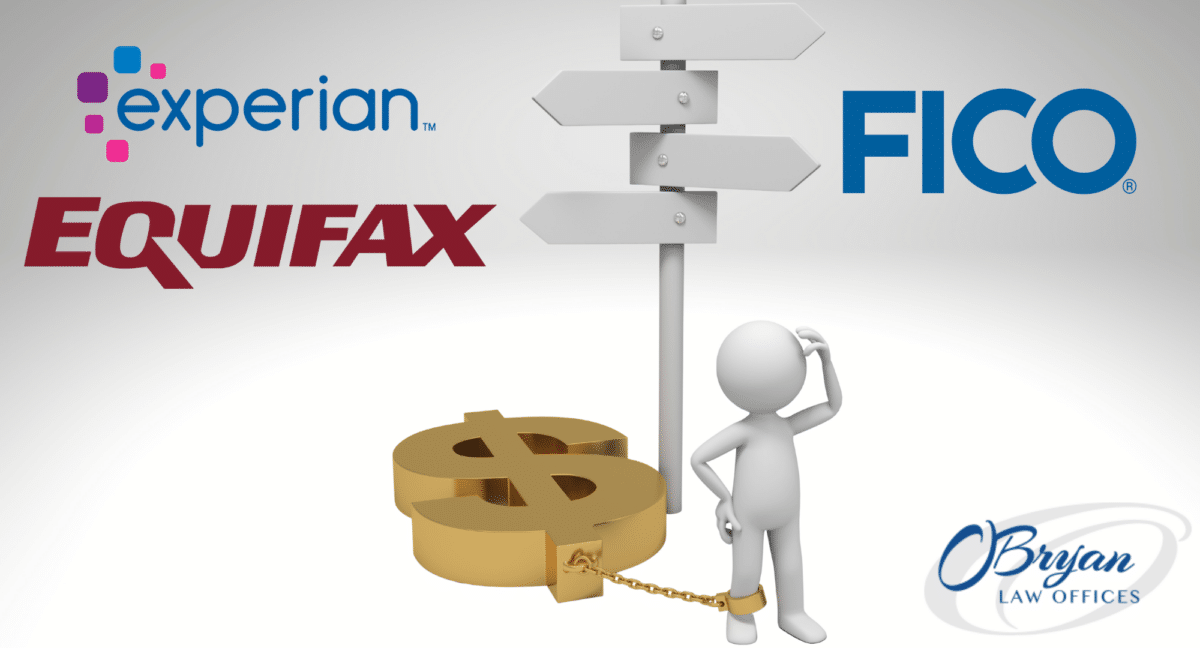Table of Contents
How Does Credit Score Work?
There are multiple credit scoring institutions, each having varying methods of calculation. As a result, most will have slightly different scores as well. The Fair Isaac Corp. (FICO) score is seen as the preferred metric for a financial institution to decide your riskiness and if they will lend you a loan or provide you a credit card. FICO is used in over 90% of lending decisions. Your FICO score is solely formulated by a credit bureau report. Other credit reporting agencies with valuable and reliable scores are Experian, TransUnion, and Equifax.
With more than 50 different credit scoring models, the score that gets reported to lenders could still be different. But your main score is an average of the 3 major credit bureaus. For example, if you have a 720 credit score, 750 credit score, and 770 credit score, your main FICO score will average to be 750. (Note that this is an example of how your main score is calculated. Scores varying in such a large degree as this should be heavily analyzed as this is unusual.) An 800 credit score and upwards are exemplary, giving you access to the best selections and rates among credit cards, loans, etc.
What’s The Credit Score Range?
FICO scores can be industry-specific scores ranging anywhere from 250 to 900. Most scores’ reporting range from 300 to 850. A higher score indicates that an individual is less of a risk to credit lenders. But they are not a perfect judge of character. There are still many wealthy people who are unable to meet their payback obligations.
There are also individuals who are poorer but have great financial responsibility and management skills. Events happen in life which can impact our abilities to pay and thus our score. But they are not an accurate judgment of the person’s riskiness or responsibility, only of their available credit payment history accounts. The FICO score does not evaluate an individual’s riskiness. It conveys a score provided by statistical data as often seen with late payments and poor financial habits or poor ability to manage debt. Individuals with 500 or higher FICO scores are not regarded as a high credit risk. The basic credit score ranges are:
580 or less: Poor
580 – 669: Fair
670 – 739: Good
740 – 799: Very Good
800 – 850: Exceptional
What Is The Highest Credit Score Possible?
Perfect credit scores of 850 are only carried by approximately 1.6% of the entire US population as of 2019. These score holders qualify for the best rates and best financial credit cards and loans (personal loans, auto loans, student loans, etc.) or mortgages. 850 is the maximum score for both FICO and VantageScore, which are the predominant scoring models used.
Why Is Your Credit Score Important?
Credit scores allow lenders to determine if you are a good or reliable candidate for their services or financial products. A higher score lowers your perceived risk and increases your reliability. The higher your score is, the more benefits you will see in return for qualifying and securing any financial credit-influenced options. Good credit scores, 650 or above, often see the majority of these benefits. Many people search questions about credit scores online, such as, “What credit score is needed to buy a car?” Understanding the importance of credit scores is half the answer.
Benefits Of Having Higher Credit Scores
Scores 700 and above can also qualify you for great rates and other benefits, especially those 760 or higher. A perfect credit score is not necessary.
Banks and credit card providers care more about the range of scores than the specifics. A broader range allows a bank to understand your diversity of risk and reliability. Refer to the FICO basic credit score ranges listed above.
Scores 740 to 790, within the very good range, will have fewer differences in benefits than if you were to improve your score from 650 (Fair) to 700 (Good). This sort of shift and progress would likely deliver you better rates and offers.
Some specific, money-saving reasons as to why you should aim for a higher credit score are:
Secure lower auto loan rates: An auto loan is a common acquisition for people unless they have the outright funds to pay for the vehicle. Good credit will help with the terms of the loan and lower average interest rates. This could be the difference between an interest rate of 4.2% and 14.97%, which is a dramatic difference in what you could be saving.
Better credit card rewards: Getting a credit card is possible across any type of credit through varying credit card lenders, but the best rewards, benefits, savings, and higher credit limits are reserved for those with good to exceptional scores.
Low mortgage rates: Mortgages are often necessities and the best options for home buyers. You should want to obtain the lowest interest rate you can. Negotiating and comparing different rates and offers is highly advised, even if you only get a slightly lower interest rate. That is because any small difference or percentage can mean the difference of tens of thousands of dollars.
More favorable insurance rates: No matter if it is auto or home insurance rates, the higher your credit score is, the more likely you are to qualify for a lower monthly premium. Note that some states ban this practice.
Savings through refinancing:Refinancing on loans after you have improved your credit score from the time you initially opened a loan account could allow you to change the terms and refinance for lower rates and save more money in the end.
Perfect Score Vs. Average Score Credit Profiles

Those that carry perfect credit scores tend to have more credit products or tradelines but have less average debt than others with an average FICO score of 701.
Those with an 850 perfect credit score had, on average, 6.4 cards compared to a national average of 3.8.
But, carriers of perfect credit scores owed less debt than half of the US average ($3,025 compared to $6,445).
In other words, besides mortgage and personal loan debt, those with credit score perfection had less debt but more credit lines.
How To Get The Highest Credit Score?
Statistically speaking, it is unlikely and uncommon to achieve a perfect credit score of 850. Considering how scores are constantly being recalculated and reevaluated by credit bureaus, the chance of maintaining a perfect score for long, if you do happen to achieve it, is also unlikely.
According to FICO, 35% of your credit score is attributed to payment history, 30% to the sum owed or credit utilization, 15% to age or length of credit history, and 10% to diversity and mix of accounts, then another 10% for new credit inquiries. (Note: FICO looks down on recent and multiple new credit inquiries). Also, other factors determine the credit score and credit reports as well. But there is no certainty with this being the way to actually calculate your score, as each area is further broken down and weighted individually; most major credit bureaus and financial institutions will not disclose the information or formula for the calculation of credit scores.
Also, changes often occur within individual credit bureaus on how they calculate. This can be in your favor, against, or overall. For example, FICO 10, as of January 2020, changes for trending data, debt, loans, and delinquencies were calculated to increase the difficulty of improving credit scores. This is directly in opposition to the 2014 and 2017 changes to reduce these factors’ weights, as well as on medical bills, tax liens, and civil judgments.
So, you shouldn’t obsess over a perfect score but focus on steady improvements to reach that range. There are a few things you can do to increase your chances of reaching a better credit score, though: make timely payments on bills, get rid of debt except for the mortgage, have a low credit utilization ratio of about 4.1%, be mindful of bank balance transfers, closing/opening lines of credit, and potentially a credit repair company to help with negative marks. Below are some strategies to focus on for your habits and credit mix if you would like to build high credit scores or improve to an excellent credit score.
Make Timely Payments on Bills
Late payments will hurt you dramatically because the recurrence of punctual payments is a large element affecting your scores. Automatic payments are useful in preventing any forgotten expenses. Be sure to track these, though, for the sake of budgeting and consider implementing a cap in case you don’t have enough money to prevent overdrawing your account and suffering additional fees.
Dispute False Negative Marks on Your Credit Report
You don’t have to have defaulted or missed a payment for there to be a mistake and an invalid negative mark that arises on any credit reports. CreditKarma allows you to view your Transunion and Equifax credit report. If there is ever anything that doesn’t look right, you should follow through and dispute it with credit card companies, who will then have to investigate and fix errors promptly. Though even if you do have some negative marks, don’t worry. They will disappear with time. Negative marks last for 7 years usually, while new credit inquiries last for up to two years.
Have a Low Credit Utilization Rate
Credit utilization has a hefty weight on the scoring models across the board. The sum of the credit limit on all your lines of credit, divided by total owed/debt balances, turns into a percentage of your credit utilization. For example, you have 2 credit cards, a limit of $2,000 and $3,000, for a total of $5,000 available credit. If you have $1,000 in outstanding balances, the money you still owe, $5,000 / $1,000 = 0.20 = 20% utilization rate.
You should aim to use no more than 30% of your obtainable credit. Keep your credit utilization rate low.
If you lower the spending out of your accessible credit, your credit utilization rate will also decrease. So, if in this example, you had $5,000 feasible credit, but $500 is owed debt, $5,000 / $500 = 0.10 = 10%, your utilization rate would only be 10%.
Regulate Hard Credit Inquiries
Hard credit inquiries come from applications for credit. Hard inquiries tend to have a negative impact on your scores, though only temporarily. Applying for credit can be seen as needing help with financial troubles. Limiting and regulating the number of hard credit inquiries you get to only when you absolutely need it will help you grow to a high credit score. Remember, new credit inquiries can last for up to two years.
Don’t Cancel Credit Cards
You should want to have a longer credit history as this greatly impacts the age of your credit and overall scores. Especially if you are aiming for perfect scores, you should show a healthy and reliable long credit history. Possessing 1 or 2 credit lines open and active always will help build a credit history, maintain a low credit utilization rate, and get you closer to the highest credit score possible.
Canceling cards should be reserved for separation/divorce, annual fees that are too high, fraud, or excessive spending temptation. Canceling a credit card doesn’t necessarily and directly harm your credit scores, though they can if done wrong. Do note that canceling lines of credit doesn’t help your credit score or credit report either.
Before canceling your credit card(s), do the following first:
- Redeem unused credit card rewards.
- Pay off ALL credit card debt and credit accounts, or at least minimize them.
- Contact your credit card issuer to cancel and confirm a $0 balance.
- Mail your credit card issuer a certified letter asking for confirmation of the $0 balance and terminated status.
- Double-check your credit report 30-45 days later to reconfirm the closure and $0 balance.
- Dispute falsities if needed, when needed, and as soon as possible.
FICO Vs. Experian Vs. Equifax

A credit report is made by credit bureaus through compiled and collected data on the individual’s borrowing financial habits and reliability on payments. These help lenders determine their risk and the appropriate amount of lending, if any, they are able to do for a borrower. Lenders can choose to make their decision on FICO’s proprietary algorithm creditworthiness score solely or through one or more of the other agencies’ credit report(s) and data for that individual. In simplistic form:
- FICO, Experian, and Equifax all assemble and report on the credit practices of people to lenders.
- FICO only supplies a numerical credit score from payment history and habits and their total debt.
- Experian and Equifax supply scores, as well as detailed reports of credit history.
FICO
Originally known as Fair, Isaac, and Company, then in 2003 became Fair Isaac Corporation, developed the FICO score in 1989. They utilize a mathematical formula that reviews many factors of consumers’ habits and financial behaviors. The exact scoring model is not public knowledge, though weights towards factors are revealed and discussed on their website. (Refer back to the section: How To Get The Highest Credit Score? For elaboration on weights for FICO.)
Maxing out credit cards, late payments, and frequent new credit inquiries all harm and lower your FICO scores. The best way to grow and achieve a higher FICO credit score is to focus on your credit mix/diversification, excellent payment history, and restraint on card balance usage. FICO is often the determining or the only determinant for banks and lenders. So even with explanations of negativity on your credit report, a low FICO may be a deal breaker for some lenders. Especially in the mortgage industry, there are strict and specific FICO minimums. FICO does not allow excuses or wiggle-room in subjectivity. If something requires a 670 or above and you have a 669, you will be denied – no if, ands, or buts.
FICO’s largest competitor for numerical scoring models is VantageScore.
Experian
Experian’s advantage is that it offers more details than FICO. Two people could both have 740 FICO scores but majorly different credit histories. Experian’s credit reports will elaborate on each person’s history, debt, and actions, allowing lenders to more thoroughly analyze the individual. FICO’s score could give a great score, simply because of the algorithm, to someone with high credit risk. This is where the details of a report are beneficial.
Equifax
Equifax also assembles a report allowing for simple analysis with details of borrowers’ history and riskiness. It can specifically allow for the exact time pinpointing of late payments and other issues. It also includes debts held by collection agencies or liens against their assets. Equifax scores range from 280 to 850. A high Equifax score usually corresponds to a higher FICO score.
Contact O’Bryan Law Offices Today
Building credit takes time, so don’t stress yourself out or make rash decisions. Also, scores of 800 or more are surely more difficult to achieve and maintain. You will need a lot of strategy and patience to get a perfect credit score or excellent credit. But, as your score grows, you will see and have more opportunities for savings from lenders. This is because your credit score acts as a judge of reliability as a borrower for lenders.
O’Bryan Law Offices can help clarify what makes up your credit score and history and strategize on how to improve your scores. We want to help!. We do our best to help individuals and their families achieve financial freedom through many different financial avenues, such as debt counseling and bankruptcy, plus more. Call us at 502-339-0222 for a free consultation.








